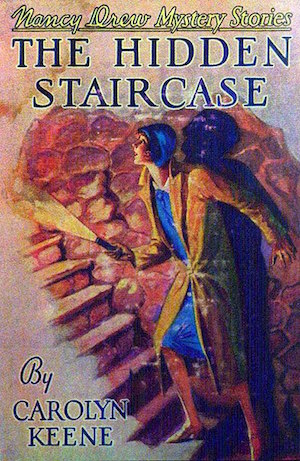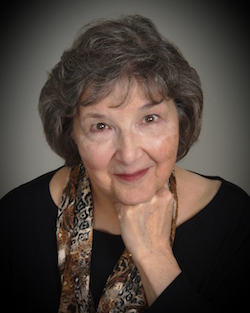This begins a new series on our blog: My Favorite Golden Age Mystery, written by our members.
 Her father gave her a gun.
Her father gave her a gun.
Nancy Drew, girl detective, was about to embark on the adventure of The Hidden Staircase (1930), and her father was worried. “[Y]ou’ve often said you wanted me to grow up self-reliant and brave,” she countered. And she had him. Instead of forbidding her to go, or insisting that she take someone with her, he handed her a revolver.
Is that cool, or what? As an overprotected middle-schooler in the mid-1950s, being squashed into a prissy femininity I knew wasn’t me, I loved it.
And there was more. In other stories of that era, males were the rescuers, and females the rescuees. Bulldog Drummond’s harebrained girlfriend, Phyllis, was kidnapped so often that one tongue-in-cheek review was titled, “Good God! The Swine Have Got Phyllis!”
In The Hidden Staircase, the swine have got Daddy. It was classic: a shady character meets Carson Drew at a train station with a vague tale of Nancy being hurt, and the next thing you know, there’s Carson trussed up in a spooky old mansion. Blonde hair flying, Nancy races to the rescue.
Alas, it didn’t last. Following World War II, women who’d had a whiff of free air in the 1920s and ’30s were thrust back into unrelenting domesticity. Consider, for instance, this excerpt from Look magazine (1956), quoted in Betsy Israel’s Bachelor Girl:
Forget the big career . . . now she gracefully concedes the top jobs to men. The wondrous creature also marries younger than ever, bears more babies and looks and acts more feminine than the emancipated girl of the 20s and 30s . . . if she makes an old-fashioned choice and lovingly tends a garden and a bumper crop of children, she rates more loud Hosannas than ever before.
Three years after that was written, Grosset and Dunlap began issuing revised versions of the early Nancy Drew titles to simplify the plots, remove racist language (by making all the characters white, but that’s another article), and bring Nancy into conformity with a more traditional model of womanhood.
There’s no gun, of course. A boyfriend has been added, to take her on a chaste date on Saturday night; and on Sunday morning, she and her father attend church.
Gone are her sauciness and autonomy. She still rescues Carson, but only with a companion ever at her side. Instead of sneaking in through a cellar window, she politely asks a realtor for the key.
I’m not alone in admiring the original Nancy, who’s been cited as a model by such luminaries as Sonia Sotomayor, Laura Bush, Hillary Clinton, Ruth Bader Ginsburg, Diane Sawyer, and Sara Paretsky. All are in their sixties or older, as I am. That’s old enough to remember when we weren’t allowed to do what the boys did, and when some of the best colleges, jobs, clubs, and awards were open only to men. But still, we had Nancy, taking names and kicking ass. Oh, yeah.
 —Joan DelFattore
—Joan DelFattore
Joan DelFattore is professor emerita in English and Legal Studies at the University of Delaware. Her current project is a memoir/research hybrid on living single, including how to deal with serious illness while living alone. Her guest blogs have recently appeared at the Washington Post, Herald Tribune, KevinMD, the Medical Republic, Psychology Today, and Psych Central.

I’m rushing out to get all the Nancy Drew books, which I’d never read as a child. How’d that happen? My grade school did not encourage this slow learner (so they said) to read ANYTHING. I just read a research blurb that stated those who read books–lots of them–tend to be much more successful that those who don’t. Your list of bright, powerful woman–YOU included–prove that right. Read on!
Thanks, Linda. I know few women as competent as you, so you and Nancy should get along well. The original version of Nancy, of course.
Back in the early 1960s, a long hot summer in the attic bedroom of my grandmother’s house allowed me to discover my mother’s collection of Nancy Drew novels (the 1940s versions). I must have been a desperately bored young boy to read those “girly” books, but once I began I couldn’t stop. Once I’d exhausted her dozen titles, it was off to the public library.
My enjoyment of those light books developed a life-long (so far anyway) love of reading — especially mysteries. Thanks for the reminder!